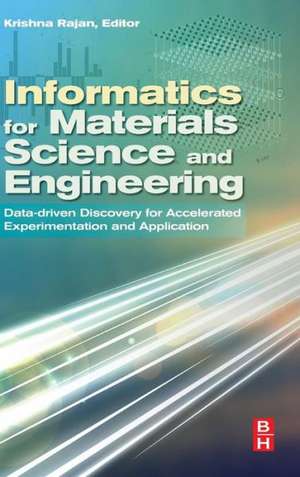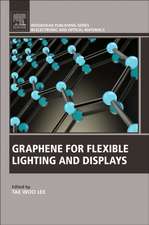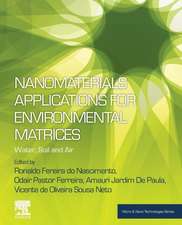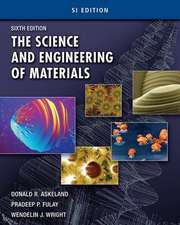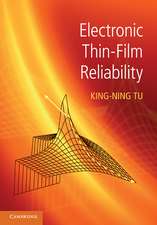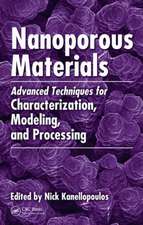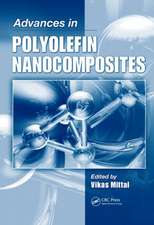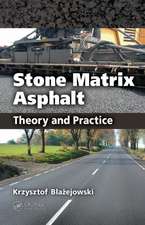Informatics for Materials Science and Engineering: Data-driven Discovery for Accelerated Experimentation and Application
Editat de Krishna Rajanen Limba Engleză Hardback – 15 iul 2013
The discovery and maturation of new materials has been outpaced by the thicket of data created by new combinatorial and high throughput analytical techniques. The elaboration of this "quantitative avalanche"—and the resulting complex, multi-factor analyses required to understand it—means that interest, investment, and research are revisiting informatics approaches as a solution.
This work, from Krishna Rajan, the leading expert of the informatics approach to materials, seeks to break down the barriers between data management, quality standards, data mining, exchange, and storage and analysis, as a means of accelerating scientific research in materials science.
This solutions-based reference synthesizes foundational physical, statistical, and mathematical content with emerging experimental and real-world applications, for interdisciplinary researchers and those new to the field.
- Identifies and analyzes interdisciplinary strategies (including combinatorial and high throughput approaches) that accelerate materials development cycle times and reduces associated costs
- Mathematical and computational analysis aids formulation of new structure-property correlations among large, heterogeneous, and distributed data sets
- Practical examples, computational tools, and software analysis benefits rapid identification of critical data and analysis of theoretical needs for future problems
Preț: 849.57 lei
Preț vechi: 1040.89 lei
-18% Nou
162.61€ • 169.12$ • 136.26£
Carte tipărită la comandă
Livrare economică 06-20 martie
Specificații
ISBN-10: 012394399X
Pagini: 542
Ilustrații: 80 illustrations
Dimensiuni: 152 x 229 x 30 mm
Greutate: 0.89 kg
Editura: ELSEVIER SCIENCE
Public țintă
Computational materials scientists, combinatorial and high-throughput experimentalists and affiliated applications specialists.Cuprins
Preface: A Reading Guide xiii Acknowledgment xv 1. Materials Informatics: An Introduction 1 2. Data Mining in Materials Science and Engineering 17 3. Novel Approaches to Statistical Learning in Materials Science 37 4. Cluster Analysis: Finding Groups in Data 53 5. Evolutionary Data-Driven Modeling 71 6. Data Dimensionality Reduction in Materials Science 97 7. Visualization in Materials Research: Rendering Strategies of Large Data Sets 121 8. Ontologies and Databases < Knowledge Engineering for Materials Informatics 147 9. Experimental Design for Combinatorial Experiments 189 10. Materials Selection for Engineering Design 219 11. Thermodynamic Databases and Phase Diagrams 245 12. Towards Rational Design of Sensing Materials from Combinatorial Experiments 271 13. High-Performance Computing for Accelerated Zeolitic Materials Modeling 315 14. Evolutionary Algorithms Applied to Electronic-Structure Informatics: Accelerated Materials Design Using Data Discovery vs. Data Searching 349 15. Informatics for Crystallography: Designing Structure Maps 365 16. From Drug Discovery QSAR to Predictive Materials QSPR: The Evolution of Descriptors, Methods, and Models 385 17. Organic Photovoltaics 423 18. Microstructure Informatics 443 19. Artworks and Cultural Heritage Materials: Using Multivariate Analysis to Answer Conservation Questions 467 20. Data Intensive Imaging and Microscopy: A Multidimensional Data Challenge 495 References 510 Index 513
Recenzii
Descriere
Materials informatics: a ‘hot topic’ area in materials science, aims to combine traditionally bio-led informatics with computational methodologies, supporting more efficient research by identifying strategies for time- and cost-effective analysis.
The discovery and maturation of new materials has been outpaced by the thicket of data created by new combinatorial and high throughput analytical techniques. The elaboration of this "quantitative avalanche"—and the resulting complex, multi-factor analyses required to understand it—means that interest, investment, and research are revisiting informatics approaches as a solution.
This work, from Krishna Rajan, the leading expert of the informatics approach to materials, seeks to break down the barriers between data management, quality standards, data mining, exchange, and storage and analysis, as a means of accelerating scientific research in materials science.
This solutions-based reference synthesizes foundational physical, statistical, and mathematical content with emerging experimental and real-world applications, for interdisciplinary researchers and those new to the field.
- Identifies and analyzes interdisciplinary strategies (including combinatorial and high throughput approaches) that accelerate materials development cycle times and reduces associated costs
- Mathematical and computational analysis aids formulation of new structure-property correlations among large, heterogeneous, and distributed data sets
- Practical examples, computational tools, and software analysis benefits rapid identification of critical data and analysis of theoretical needs for future problems
